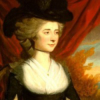Fanny Burney

Fanny Burney
Frances Burney, also known as Fanny Burney and after her marriage as Madame d'Arblay, was an English novelist, diarist and playwright. She was born in Lynn Regis, now King's Lynn, England, on 13 June 1752, to musical historian Dr. Charles Burneyand Esther Sleepe Burney. The third of six children, she was self-educated and began writing what she called her "scribblings" at the age of ten. In 1793, aged 41, she married a French exile, General Alexandre D'Arblay. Their only son,...
NationalityEnglish
ProfessionNovelist
Date of Birth13 June 1752
There is something in age that ever, even in its own despite, must be venerable, must create respect and to have it ill treated, is to me worse, more cruel and wicked than anything on earth
I cannot be much pleased without an appearance of truth; at least of possibility I wish the history to be natural though the sentiments are refined; and the characters to be probable, though their behaviour is excelling
The mind is but too naturally prone to pleasure, but too easily yielded to dissipation
O! how short a time does it take to put an end to a woman's liberty!
credulity is the sister of innocence ...
an old woman ... is a person who has no sense of decency; if once she takes to living, the devil himself can't get rid of her.
while we all desire to live long, we have all a horror of being old!
while all the pomp and circumstance of war animated others, it only saddened me; and all of past reflection, all of future dread, made the whole grandeur of the martial scene, and all the delusive seduction of martial music, fill my eyes frequently with tears ...
to be sure, marriage is all in all with the ladies; but with us gentlemen it's quite another thing!
falsehood is not more unjustifiable than unsafe.
To save the mind from preying inwardly upon itself, it must be encouraged to some outward pursuit. There is no other way to elude apathy, or escape discontent; none other to guard the temper from that quarrel with itself, which ultimately ends in quarreling with all mankind.
to diminish expectation is to increase enjoyment.
To Nobody, then, will I write my Journal! since to Nobody can I be wholly unreserved, to Nobody can I reveal every thought, every wish of my heart, with the most unlimited confidence, the most unremitting sincerity, to the end of my life!
But how cool, how quiet is true courage!